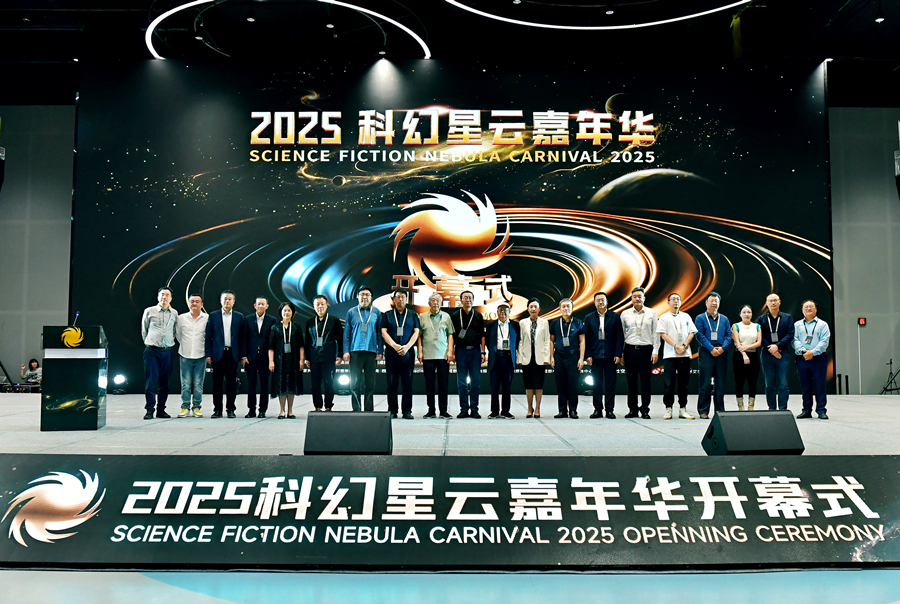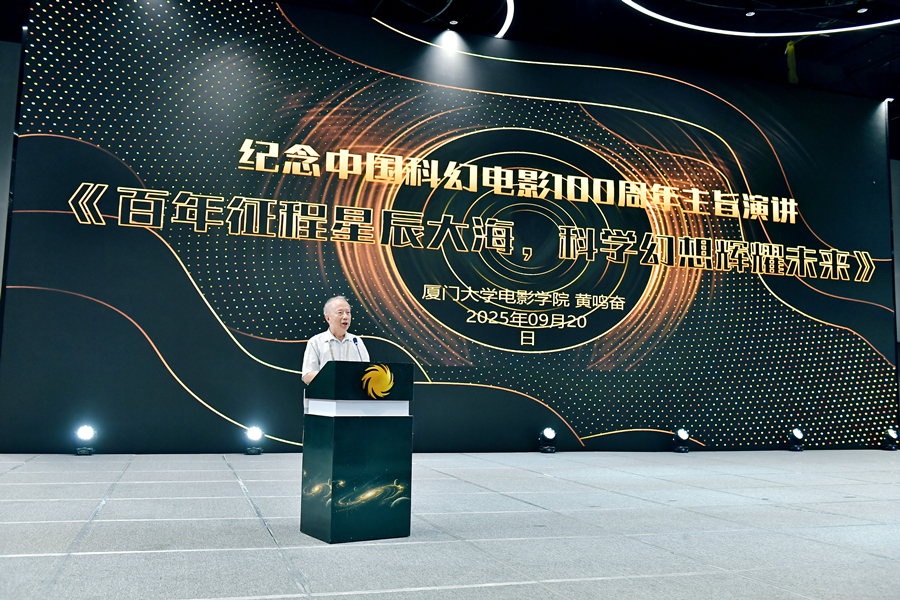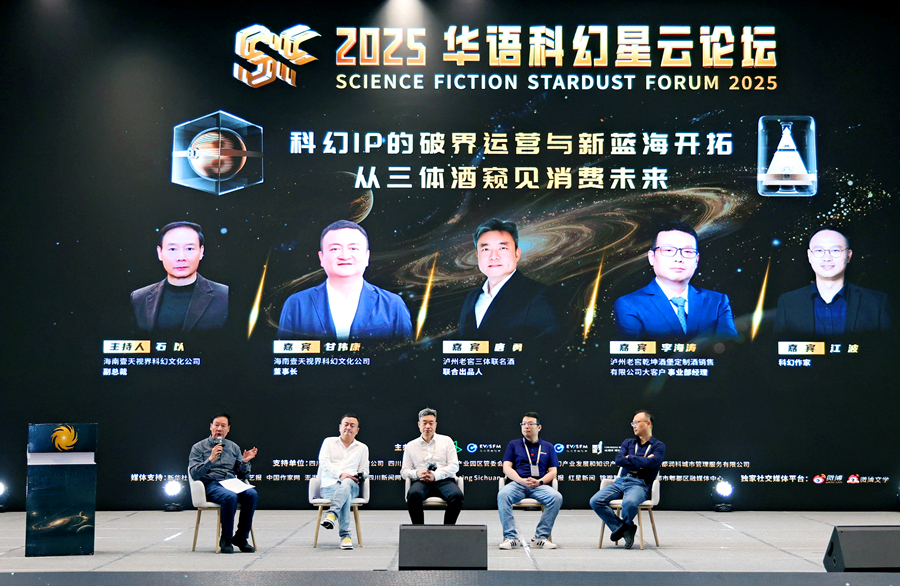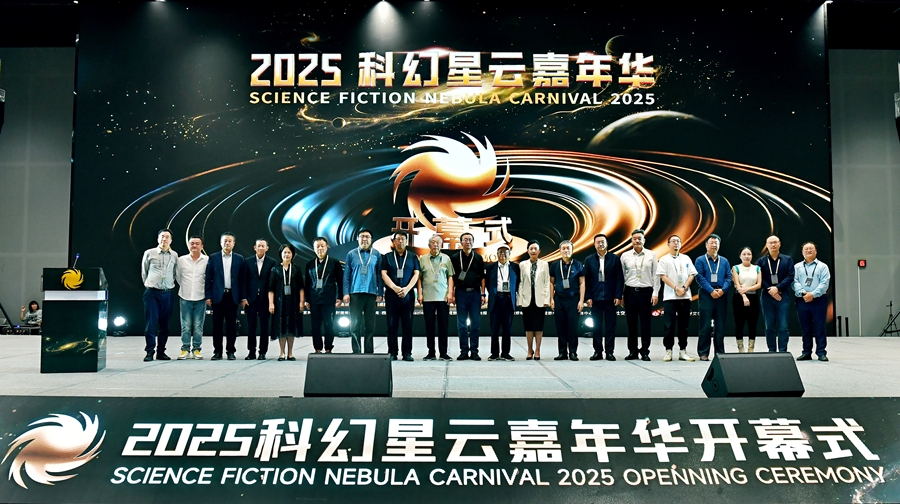The Science Fiction Nebula Carnival 2025 took place in Chengdu, Sichuan province on Sept. 20 celebrating Chinese sci-fi achievements and the 100th anniversary of its sci-fi cinema, while exploring the genre's future direction and cross industry integration.

Organizers and guests launch the Science Fiction Nebula Carnival 2025 in Chengdu, Sichuan province, Sept. 20, 2025. [Photo courtesy of EV/SFM]
Chinese science fiction luminary Liu Cixin praised the Chinese Nebula Awards in his opening speech, highlighting their 16-year evolution into an authoritative platform that has recognized hundreds of writers and launched emerging talents. He stated that the 16th edition would continue to nurture future pioneers, with a strong focus on innovation and the unique style of young writers.
"The Chinese Nebula Awards have become a vital window showcasing the creation and industrial development of Chinese-language science fiction, as well as a platform for exchange between Chinese and global science fiction," Liu said. "May the Chinese Nebula Awards advance into the future with Chinese science fiction — until one day, humanity truly embarks on a journey to the nebula."
The carnival opened at the Chengdu Science Museum, the same venue that hosted the 2023 World Science Fiction Convention (Worldcon). It attracted more than 500 experts, insiders and professionals from the sci-fi and related industries. A major highlight this year was the centennial celebration of Chinese science fiction cinema.
In 1925, "The Invisibility Cloak" was released. Adapted from a sci-fi work by writer Xu Zhuodai, the film is widely regarded as China's first science fiction movie, though no complete copy has been recovered — only several stills and news reports remain.

Huang Mingfen, a professor and film theorist from Xiamen University, delivers a keynote speech marking the centennial celebration of Chinese science fiction cinema in Chengdu, Sichuan province, Sept. 20, 2025. [Photo courtesy of EV/SFM]
Huang Mingfen, a professor and film theorist from Xiamen University, gave a keynote speech tracing the development of Chinese sci-fi films over the past century. He explained how Chinese sci-fi cinema has evolved from "scientific enlightenment" to "industrial narrative," and then advanced to "cosmic philosophy." Huang highlighted that the recent success of Chinese sci-fi films represents the emergence of a unique local aesthetic focused on collective heroism and Eastern redemption stories, distinguishing it from Western approaches to storytelling.
Later that night, science fiction writers, academic experts, technology pioneers, video game developers, and AIGC professionals came together for in-depth discussions. They focused on preserving the legacy of sci-fi cinema and the transformative impact of AI technology. The group explored how AI can make rendering sci-fi scenes more efficient, reduce costs, drive innovation, and improve production of AIGC short films. Overall they expressed great optimism toward the future potential of sci-fi filmmaking.
The roundtables and forums focusing on industry integration and development put emphasis on industrial advances and human-machine collaboration in Chinese sci-fi film and game adaptations.
The evolution of sci-fi art and IP expansion were discussed alongside emerging talents transitioning from traditional to multi-form narratives. During a session on the artistic language and visual creativity of Chinese sci-fi, brain-computer interface technology for emotion rendering was also demonstrated.

A panel discussion on sci-fi IP development during the Science Fiction Stardust Forum session of the Science Fiction Nebula Carnival 2025 in Chengdu, Sichuan province, Sept. 20, 2025. [Photo courtesy of EV/SFM]
The full-day event also included new book launches from several publishers and the signing of multiple deals for various projects. This included books and AIGC productions. The event peaked with an awards ceremony to announce winners and present prizes for the 16th Chinese Nebula Awards, including the best novel award for "Golden Peaches" by Yang Wanqing.
Dong Renwei, chairman of the executive committee of the Science Fiction Nebula Carnival, noted that sci-fi cinema has matured over the past century, and sci-fi literature is experiencing a golden age, thanks to the Hugo Award-winning "The Three-Body Problem." China's sci-fi industry is now at a new promising starting point of going global. He emphasized that all of this, alongside increased popularity of other film and television series is a key indicator of Chinese sci-fi's shift from a literary golden age to an industrial golden age. "This carnival is precisely the trumpet sounding the march toward the golden age of China's sci-fi industry," he said.
Gan Weikang, one of the event's organizers and president of Hainan Eternal Vision Science Fiction Media Co. (EV/SFM), mentioned "Three-Body" liquor, a product he developed in collaboration with Luzhou Laojiao and Three-Body Universe. The drink, launched earlier this year, proved highly popular as a pioneering cross-industry partnership between baijiu and the science fiction sector. Speaking on this subject, Gan stated,"Based on my experience in the sci-fi business, my biggest insight is the need to create something tangible that ordinary people can touch and engage with in daily life…I want to bring science fiction off the bookshelf and into people's lives."


 Share:
Share: 




 京公网安备 11010802027341号
京公网安备 11010802027341号